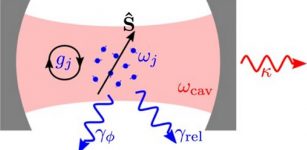Fastest Possible Speed Of Sound Discovered
Eddie Gonzales Jr. – MessageToEagle.com – The fastest possible speed of sound has been discovered by a team of researchers from the Mary University of London, the University of Cambridge, and the Institute for High Pressure Physics in Troitsk.

Credit: Public Domain
The result- about 36 km per second – is around twice as fast as the speed of sound in diamond, the hardest known material in the world.
However, until now it was not known whether sound waves also have an upper-speed limit when traveling through solids or liquids.
Sound waves can travel through different mediums, such as air or water, and move at different speeds depending on what they’re traveling through.
For example, they move through solids much faster than they would through liquids or gases, which is why you’re able to hear an approaching train much faster if you listen to the sound propagating in the rail track rather than through the air.
Einstein’s theory of special relativity sets the absolute speed limit at which a wave can travel, which is the speed of light and is equal to about 300,000 km per second.
The study shows that predicting the upper limit of the speed of sound is dependent on two dimensionless fundamental constants: the fine structure constant and the proton-to-electron mass ratio.
These two numbers are already known to play an important role in understanding our Universe, but they are also important for other scientific fields, such as materials science and condensed matter physics, by setting limits to specific material properties such as the speed of sound.
The scientists tested their theoretical prediction on a wide range of materials and addressed one specific prediction of their theory- that the speed of sound should decrease with the mass of the atom. This prediction implies that the sound is the fastest in solid atomic hydrogen. However, hydrogen is an atomic solid at very high pressure, above 1 million atmospheres only, pressure comparable to those in the core of gas giants like Jupiter.
At those pressures, hydrogen becomes a fascinating metallic solid, conducting electricity just like copper and is predicted to be a room-temperature superconductor.
Therefore, researchers performed state-of-the-art quantum mechanical calculations to test this prediction and found that the speed of sound in solid atomic hydrogen is close to the theoretical fundamental limit.
“Soundwaves in solids are already hugely important across many scientific fields,” Professor Chris Pickard, Professor of Materials Science at the University of Cambridge, said.
Seismologists use sound waves initiated by earthquakes deep in the Earth interior to understand the nature of seismic events and the properties of Earth composition.
Also, materials scientists are interested in the subject because sound waves are related to important elastic properties including the ability to resist stress.”
Apparently, the study of soundwaves has very important applications in science.
“We believe the findings of this study could have further scientific applications by helping us to find and understand limits of different properties such as viscosity and thermal conductivity relevant for high-temperature superconductivity, quark-gluon plasma and even black hole physics,” Professor Kostya Trachenko, Professor of Physics at Queen Mary, added.
Written by Eddie Gonzales Jr. – MessageToEagle.com Staff










